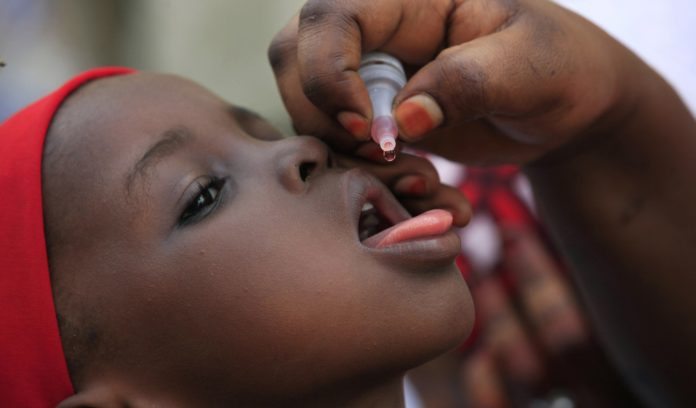
Tuesday marked one year since Africa has recorded any new polio cases, a monumental step toward the continent being completely rid of the disease.
Since a case was recorded in Somalia a year ago, there has been no evidence of any new incidents, an accomplishment that is being attributed to a collaborative, multi-tiered effort to boost vaccination rates, UNICEF noted. Volunteers, religious leaders, health workers and government agencies have banded together to bring vaccines to rural areas and to dispel myths associated with getting the shots.
Polio is a devastating and highly infectious viral disease that mainly affects children under the age of 5. The virus attacks the body’s central nervous system and can lead to irreversible paralysis in a matter of hours, according to the Global Polio Eradication Initiative. In severe cases, the throat and chest may be paralyzed, leading to death if the patient does not receive artificial breathing support.
Once considered to be one of the world’s most feared diseases, instances of the illness dropped dramatically with the introduction of the vaccine in 1955. India was the last major country in the world to report cases in 2011, and around the world, concentrated polio vaccine campaigns have pushed the illness back from human populations. As of last year, polio remained endemic in only three countries — Afghanistan, Pakistan, and Nigeria — though sporadic cases have continued to pop up in other countries.
While Somalia has had its hopeful moments over the years, the disease hasn’t yet been completely wiped out (though it’s not considered endemic). After three polio-free years, the disease resurfaced in 2005 in Somalia with 185 confirmed cases, and smaller outbreaks the following three years, according to UNICEF. In 2008 there was an outbreak in Jonglei State, close to the border with Ethiopia.
“It is hard to describe the isolation of this place — an area of marshes, vast cotton-soil plains that become impassable after rains, and an area that has long been plagued by insecurity,” Peter Crowley, head of UNICEF’s polio unit, wrote in a blog post.
Yet, despite such challenges, the outbreak was contained and the area has not experienced a new case since last August.
Eradication Efforts
To effectively protect Somalians from the disease, advocates have looked to religious leaders to urge their congregants to get vaccinated. Some parents resisted getting their children vaccinated, saying that it conflicted with their religious beliefs. But in 2007, the country saw a major breakthrough when 40 religious leaders from North East Somalia declared their support for polio prevention efforts.
“We agree with the conclusions of the doctors,” Hagi Ali Ahmed, a sheikh from Puntland, said in a statement. “Rumors were wrong. Religious leaders must create awareness in all mosques and among the community.”
Nigeria is also on its way to becoming polio-free, according to the World Health Organization:
Nigeria, the last endemic country in the African region, marked one year without a case of wild polio on 24 July 2015. If continued lab results in the coming weeks confirm no new cases in Nigeria, and if the WHO African Region then goes 2 more years without a case of wild polio in the face of strong surveillance, it could be certified polio-free by the Africa Regional Certification Commission.
Health workers have also contended with deleterious pushback in Nigeria. Vaccinators were periodically attacked and killed because religious leaders believed their work to be part of a Western plot to sterilize Muslim children. In fact, it was these unfounded fears, and others like it, that in 2006 were responsible for a resurgence of polio in Nigeria and subsequent outbreaks in more than 20 other countries where the disease was once stamped out.
 But while health workers have made extraordinary gains in assuaging suspicions in Nigeria and Somalia, religious leaders have once again grown wary of vaccine campaigns in Kenya.
But while health workers have made extraordinary gains in assuaging suspicions in Nigeria and Somalia, religious leaders have once again grown wary of vaccine campaigns in Kenya.
The country’s Conference of Catholic Bishops recently boycotted WHO’s polio vaccine campaign, saying they need to “verify” that there is no presence of estrogen in the shots, NPR reported. Dr. Wahome Ngare of the Kenyan Catholic Doctor’s Association accused the organization of introducing female hormone that could sterilize children. The same organization peddled similar misinformation about the tetanus vaccine a year ago, despite no evidence (anecdotal or empirical) that either vaccine has ever contained estrogen or caused infertility. The safety of the vaccine was confirmed once again in a study published this week in The Lancet medical journal.
Last year, for the first time ever, the WHO declared the spread of polio to be an international public health emergency after the disease started reappearing in countries previously free of the disease, such as Syria and Iraq, where civil war or unrest is complicating vaccination efforts.
So while health workers and advocates are celebrating Somalia’s latest polio milestone, they’re not at ease just yet. It will take another two years before the country can officially declare itself polio-free.
“While today’s milestone is extraordinary, it is not an endpoint,” UNICEF’s Crowley said. “Nigeria and the many other African countries that remain at risk for polio must maintain high-quality surveillance, work ever-harder to improve the quality of vaccination campaigns and act decisively, should further outbreaks occur.”
